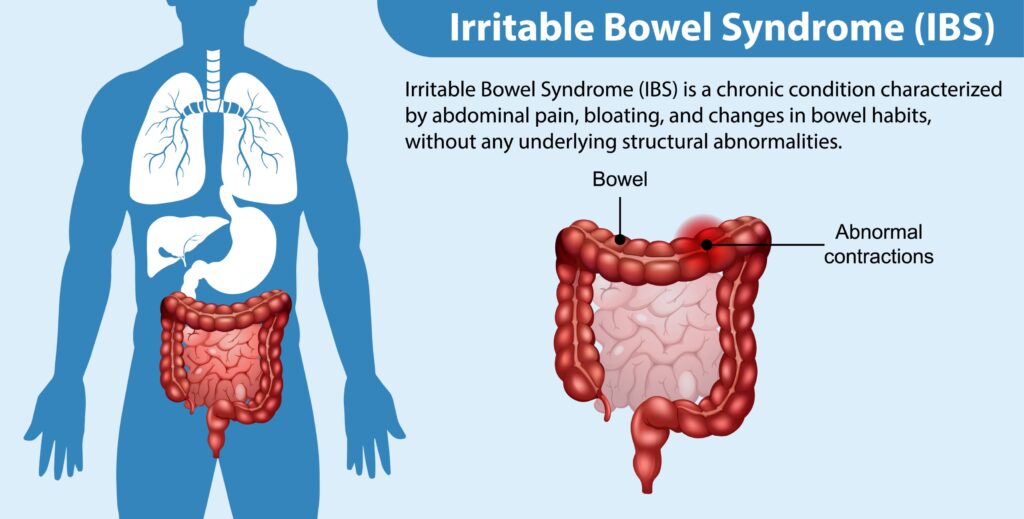Hey gut explorers, let’s talk about Irritable Bowel Syndrome (IBS), or as we like to call it, the “rollercoaster of digestive dramas.” Imagine your belly as a bustling city with traffic jams, detours, and unexpected roadblocks. That’s IBS in a nutshell – a wild adventure where your unhealthy gut calls the shots. But fear not! We’re here to navigate you through the twists and turns, with an in-depth look into IBS, its symptoms, causes, treatment and complications.
Firstly, Irritable Bowel Syndrome (IBS) is a common gastrointestinal disorder and it’s estimated that 5-10% of the population has IBS. It is typically characterized by a cluster of symptoms, including abdominal pain, bloating, and changes in bowel habits. However despite being common, IBS remains a complex condition with vastly different triggers and treatment approaches. So, first of all let us have a look at some of the most common symptoms of IBS which are:
- Abdominal pain or discomfort, often relieved by defecation
- Constant or recurring bloating and gas
- Diarrhea, constipation, or alternating between the two
- Mucus in the stool
- Feeling of incomplete bowel movement
Now that we know the major and most common symptoms of IBS, let us have a look at what kind of complications it may lead to.
Complications of Irritable Bowel Syndrome (IBS)

Although IBS itself does not cause exceptionally serious medical complications, it can have a significant impact on an individual’s quality of life. Chronic symptoms like anxiety and depression often accompany the condition, which might lead to sleep disturbances and reduced engagement in social activities. Due to this, productivity may suffer, and overall quality of life can be significantly impacted. Aside from this, on some cases, severe and persistent symptoms of IBS can result in complications such as malnutrition, dehydration from diarrhea, rectal bleeding, or fecal impaction. These challenges and complications highlight the importance of managing IBS symptoms effectively to improve well-being and restore a sense of normalcy. But before we get to that, let’s find out what could be the reasons behind this condition.
Causes of Irritable Bowel Syndrome (IBS)

The exact causes of Irritable Bowel Syndrome (IBS) are not fully understood, but several factors may contribute to its development. Some of the identifiable causes are:
- Abnormalities in gastrointestinal motility: IBS is associated with alterations in the movement of the digestive tract, leading to symptoms like diarrhea or constipation.
- Changes in gut microbiota: Imbalances in the gut microbiome have been implicated in the development of IBS. This can happen due to poor lifestyle choices and insufficient intake of probiotics.
- Sensitive nerves in the gut: Heightened sensitivity to pain and discomfort in the gastrointestinal tract can lead to the development of IBS as well.
- Psychological factors: Negative psychological conditions such as stress, anxiety, and depression can contribute to the symptoms of IBS.
- Genetics: Studies have shown that IBS tends to run in families, suggesting a genetic component to the condition, however, it is not fully understood yet.
While the precise cause may vary from person to person, a combination of these factors is often implicated as the cause of IBS. But since many other conditions have similar causes and symptoms, how can one diagnose IBS?
Diagnosis of Irritable Bowel Syndrome (IBS)
Diagnosing IBS involves a thorough evaluation of symptoms and medical history. Diagnostic criteria, such as the Rome criteria, help healthcare providers classify IBS subtypes based on symptom patterns. Aside from this, diagnostic tests such as blood tests, stool studies, and imaging tests, are also performed to rule out other gastrointestinal conditions with similar symptoms. Now that we know enough about IBS, let us find out how you can battle it out.
Treatment Options for Irritable Bowel Syndrome (IBS)

First of all, let us look at some of the proven home remedies and self care routine for IBS which you can try out on your own. These include:
- Peppermint oil: Peppermint oil capsules may help alleviate abdominal pain and bloating in some individuals with IBS.
- Herbal teas: Chamomile tea, ginger tea, and fennel tea may help soothe digestive discomfort and reduce bloating.
- Fiber supplements: Soluble fiber supplements, such as psyllium, can help regulate bowel movements and alleviate constipation in individuals with IBS-C.
- Dietary modifications: Following a low-FODMAP diet, reducing intake of gas-producing foods, and avoiding trigger foods can help manage IBS symptoms. That aside, it is advised to take adequate prebiotics (fiber rich food) as they serve as the food for good bacteria.
- Probiotics: Certain strains of probiotics may promote gut health and reduce symptoms of IBS. So, taking yogurt, curd, kimchi, kefir or supplements, will increase the good bacteria count. And coupling this with prebiotics will create a healthy ecosystem in your gut.
- Lifestyle changes: Stress management techniques, regular exercise, and adequate sleep can help reduce IBS symptoms and improve overall well-being.
You do not need to be a pro to follow the above mentioned remedies, however, if your condition persists, you must seek medical attention. Some common treatment approaches to IBS include:
- Medications: Depending on symptom severity, medications such as antispasmodics, laxatives, or antidepressants may be prescribed to relieve symptoms.
- Psychological therapies: Cognitive-behavioral therapy (CBT), hypnotherapy, and relaxation techniques can help individuals manage stress and anxiety associated with IBS.
So, while IBS can significantly impact an individual’s quality of life, effective management strategies, dietary modifications, medications, lifestyle changes, and home remedies, can help alleviate symptoms and improve overall well-being. However, in any case, if you suspect having IBS, consult a healthcare professional for proper evaluation and personalized treatment recommendations. Here’s to bidding farewell to belly woes and embracing a future filled with laughter, love, and well-behaved bowels!
REFERENCES
1. NHS Inform – https://www.nhsinform.scot/illnesses-and-conditions/stomach-liver-and-gastrointestinal-tract/irritable-bowel-syndrome-ibs/
3. AboutIBS – https://aboutibs.org/what-is-ibs/facts-about-ibs/
4. Mayo Clinic – https://www.mayoclinic.org/diseases-conditions/irritable-bowel-syndrome/symptoms-causes/syc-20360016
5. Healthline – https://www.healthline.com/health/ibs-home-remedies-that-work
6. NIH – https://www.niddk.nih.gov/health-information/digestive-diseases/irritable-bowel-syndrome/diagnosis
7. John Hopkins Clinic – https://www.hopkinsmedicine.org/health/treatment-tests-and-therapies/irritable-bowel-syndrome-treatment
FAQ’s
Q. What foods trigger IBS?
A. Common triggers for Irritable Bowel Syndrome (IBS) include high-FODMAP foods like onions and garlic, gas-producing foods such as beans and cabbage, spicy foods, fatty foods, alcohol, caffeine, artificial sweeteners, gluten-containing foods, and dairy products for some.
Q. What are the 4 stages of IBS?
A. The four stages of Irritable Bowel Syndrome (IBS) include diagnosis, understanding triggers and symptoms, management through dietary changes, lifestyle modifications, and medication, and long-term maintenance of symptoms to achieve symptom relief and improve quality of life. It’s essential to work closely with healthcare providers at each stage for effective management.
Q. Is IBS permanent?
A. IBS is a chronic condition, meaning it is long-term, but symptoms can fluctuate over time. With proper management and lifestyle changes, many individuals can effectively control their symptoms and improve their quality of life.
Q. Can IBS cause weight gain?
A. Although Irritable Bowel Syndrome (IBS) is not typically associated with weight gain, some individuals with IBS may experience fluctuations in weight due to factors such as changes in appetite, dietary habits, and bloating. Additionally, certain medications used to manage IBS symptoms may affect weight in some individuals.
Q. Is fasting good for IBS?
A. Fasting is not generally recommended for individuals with Irritable Bowel Syndrome (IBS), as it can potentially worsen symptoms by causing irregularities in digestion and triggering abdominal discomfort. You must maintain regular, balanced meals and snacks throughout the day to support gut health and manage symptoms effectively.
Q. Who is most at risk for IBS?
A. IBS can affect individuals of all ages, but it often begins in early adulthood and peaks in middle age. Additionally, women are more commonly affected by IBS than men. Also, with a family history of the condition, a history of gastrointestinal infections or food poisoning, or mental health conditions such as anxiety or depression are at higher risk.




